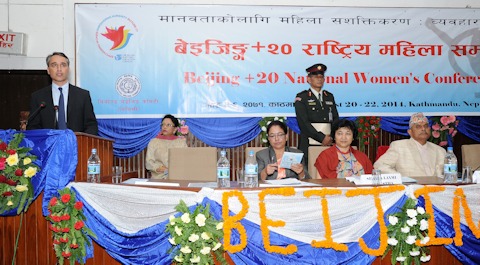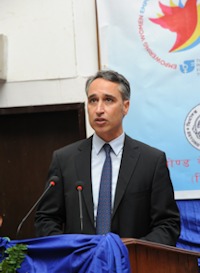Remarks by Ziad Sheikh at the National Women’s Conference on Beijing+20 Inauguration session
UN Women Representative, Ziad Sheikh’s remarks on behalf of the United Nations and the UN Resident Coordinator at the National Women’s Conference on Beijing+20 Inauguration session, Kathmandu, NepalDate:

Photo credit: Pradeep Shakya
Right Honorable President Dr. Ram Baran Yadav,
Honorable Minister for the Ministry of Women, Children and Social Welfare, Nilam K.C. Khadka,
Chief Secretary Lilamani Poudel,
Convenor, National Network for Beijing Review Nepal, Bandana Rana,
Chairperson, Beyond Beijing Committee, Shanta Laxmi Shrestha,
Advisor for National Beijing +20 Conference, Chandni Joshi,
District Representative, Tripta Lungeli Magar,
Participants from Kathmandu and the districts,
Distinguished guests,
Ladies and Gentlemen,
Good Morning and Namaste
It gives me great pleasure, on behalf of the United Nations and the UN Resident Coordinator, to join you today for Nepal’s national consultation for Beijing+20, a national consultation that brings together women from across the country so stories about their lives, about their daily realities can be heard through their voices.
It was in September 1995, that the United Nations brought together almost 50,000 men and women from across the world in Beijing for its Fourth World Conference on Women. It was a major turning point for the global women’s movement. The Beijing Declaration and Platform for Action, adopted by 189 countries, remains to this day the most effective and comprehensive policy framework for achieving gender equality.

Photo credit: Pradeep Shakya
While policies are essential to fostering positive changes, discussions and dialogues such as this - that involve women from across the nation - is of paramount importance to attaining the commitments declared in the policies. This is an opportunity for all the women present here to bring forth your voices and play your part in securing a society that you dream of for yourself and for your daughters. You are the agents of change that you desire.
When it comes to thinking about women as agents of change, as decision-makers, out thoughts are shaped by ingrained prejudices that have taken hold throughout generations. This is what women across the world struggle against on a daily basis. We need a new way of thinking, a way of thinking and acting which respects and strives for equal rights for all and equal opportunities for all. Only then will we truly be on the path towards gender equality.
This three-day consultation is an opportunity to review the progress made by Nepal against its commitments under the Beijing Platform for Action and to highlight the work that remains. We must also ask ourselves why progress is being held back and what further actions and resources are required to break the cycle of discrimination against women. With the leadership of the government, civil society, women’s organizations, the UN and development partners all have important roles to play.
In the past 20 years, significant progress for women’s empowerment and gender equality has taken place in Nepal. The country has made significant achievement against the MDGs, especially poverty reduction. Women have hugely contributed to this achievement as civil servants, migrant workers, economists, lawmakers, through the agriculture, health, education sector etc. Reservations for women in the judiciary, civil services and education are notable policy commitments. And the Government has enacted the Domestic Violence (Crime and Punishment) Act. With all these achievements, existing challenges remain and new challenges have emerged which need to be addressed with utter seriousness. Women in the rural areas still have limited access to basic services. Representation of women in across the public sectors is still largely limited to lower positions. And there is a huge gender gap at the policy and decision making levels. But perhaps most urgent and pressing of all is the need to end violence against women. Women must be able to live lives free from violence and free from the fear of violence. Women and girls can be whatever they want to be, whatever their country wants them to be; but equal opportunities and a suitable environment has to be provided to them.
The Government of Nepal, in its national review of the implementation of Beijing commitments has clearly stated several improvements and challenges in the achievement of gender equality and empowerment of women. It is important to highlight that the Ministry of Women, Children and Social Welfare is in the process of developing a ten-year strategic plan that will focus on 19 priority strategies and actions in order to promote gender equality, to control gender based violence and combat trafficking. Along with creating a clear division of roles and responsibilities, coordination with other ministries and with other stakeholders is equally important.
Beijing+20 takes place at a strategic moment, coinciding with the deadline for the achievement of the Millennium Development Goals and the elaboration of the post-2015 development agenda and framework for sustainable development. UN Women is advocating for a stand-alone goal for gender equality and women’s empowerment as part of the new development agenda.
I would like to acknowledge BBC and NNBN’s remarkable collaboration and its tireless efforts in bringing together more than 300 women from across the nation to have their voices heard so that they can find a space in the policies and plans that will be laid out for the years to come. The Beijing Declaration and Platform for Action were not simply promises to achieve gender equality but also roadmaps for how we can make those promises a reality. They allow us to have a central human rights-based agenda on the lives of females that we can continue to add to. These processes will provide us a better opportunity to position gender equality, women’s rights and women’s empowerment at the heart of the global agenda.
I trust these consultations will bring forth a concrete and decisive report from which we can build an agenda for women’s empowerment and blueprint for advancing women's rights.
In closing, I would like to thank the Government of Nepal, the Ministry of Women, Children and Social Welfare in particular, for your endeavor to create a safer and better world for Nepali women. I would also like to thank BBC, NNBN, civil society groups, individuals and all participants, especially from the districts, who made this conference possible.
The United Nations remains committed and is ready to provide support for the cause of gender equality and women’s empowerment in Nepal. When women’s lives are free from violence and discrimination, nations thrive. With this clear message in mind, let us act decisively with the knowledge that empowering women and girls and supporting their full participation is essential for a better future for all.
Thank you